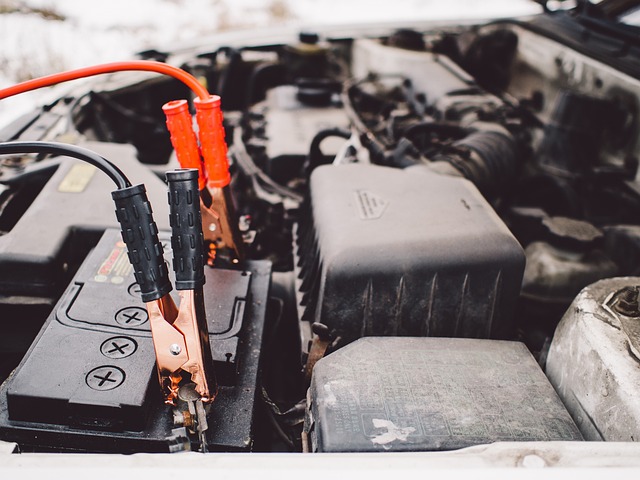Heat and cold temperatures significantly impact car battery performance and longevity. Extreme heat accelerates chemical reactions, causing electrode degradation, electrolyte evaporation, and increased resistance, leading to reduced capacity and more frequent battery replacements. Cold weather temporarily affects performance but isn't always a reason for replacement; modern batteries with insulation can retain power. To optimize battery health, regular maintenance, terminal cleaning, voltage regulators, and parking in shaded areas are recommended, reducing the need for premature "replace car battery" operations.
“Explore the intricate relationship between heat and battery performance in modern vehicles. This article delves into how extreme temperatures, both high and low, affect your car’s battery functionality. We examine the sensitivity of batteries to heat, its impact on life expectancy, and performance. Additionally, we offer strategies to optimize battery health during varying weather conditions, ensuring a reliable start when replacing your car battery. Understanding these effects is crucial for maintaining vehicle reliability.”
- Understanding Battery Functionality and its Sensitivity to Heat
- The Impact of High Temperatures on Battery Life and Performance
- Low Temperature Effects on Car Battery Efficiency – A Counterpoint
- Optimizing Battery Health: Strategies for Extreme Weather Conditions, Including Heat
Understanding Battery Functionality and its Sensitivity to Heat

Batteries, a crucial component in modern vehicles, serve as the power source for various systems, from ignition to lighting and electric motors. Understanding how heat impacts battery performance is essential, especially when considering a replace car battery scenario. Heat sensitivity is inherent in battery chemistry; extreme temperatures can disrupt the delicate balance of chemical reactions inside, affecting both energy storage and discharge capabilities.
In hot conditions, batteries may experience reduced capacity and efficiency due to thermal degradation. This is particularly noticeable in regions with high ambient temperatures, leading to faster drain and potential failure. Conversely, cold weather can also cause issues, though in a different manner—it slows down chemical reactions, making it harder for the battery to deliver the required power. Thus, both extreme heat and cold present challenges that can prompt the need to replace car batteries more frequently.
The Impact of High Temperatures on Battery Life and Performance

High temperatures can significantly impact the life and performance of a car battery, often leading to its premature replacement. When batteries operate at elevated temperatures, whether due to hot climates or inefficient cooling systems, several detrimental changes occur. Internally, the chemical reactions that power the battery are accelerated, causing faster degradation of the active materials in the electrodes. This accelerated wear and tear results in reduced capacity and lower voltage output over time.
Moreover, extreme heat can cause the electrolyte within the battery to evaporate more quickly, leading to a decrease in liquid levels and potentially damaging the internal components. This fluid loss not only hinders the battery’s ability to maintain a consistent charge but also increases resistance, generating additional heat, creating a vicious cycle that further deteriorates performance. As such, maintaining optimal temperature conditions is crucial for prolonging the lifespan of a car battery and ensuring reliable operation.
Low Temperature Effects on Car Battery Efficiency – A Counterpoint

While cold temperatures are known to hinder battery performance, it’s important to note that low-temperature effects on a car battery can be somewhat of a counterpoint when considering replacement needs. In fact, extreme cold can cause some batteries to temporarily lose charge or power, making them seem less efficient. However, modern car batteries are designed with insulation and specialized chemicals to mitigate these issues, ensuring they maintain a significant level of performance even in frigid conditions.
Contrary to popular belief, many auto experts argue that replacing a car battery due solely to cold weather isn’t always necessary. Proper maintenance, such as keeping the battery terminal clean and ensuring there’s no corrosion, can extend its lifespan, regardless of seasonal fluctuations. In fact, some batteries are specifically designed for colder climates, offering enhanced performance and durability in low-temperature environments.
Optimizing Battery Health: Strategies for Extreme Weather Conditions, Including Heat

Extreme heat can significantly impact the health and performance of car batteries, causing them to degrade faster. During hot weather conditions, a vehicle’s battery works harder to power various systems, leading to increased electrical demand. This places additional strain on the battery, potentially reducing its lifespan. To optimize battery health in such scenarios, it’s crucial to employ specific strategies.
One effective approach is regular maintenance, including checking and cleaning battery terminals to ensure optimal connectivity. Using a voltage regulator or smart charger can also help manage excessive charging and prevent over-temperature issues. Moreover, keeping the battery cool by parking the vehicle in shaded areas during hot days can significantly prolong its life. If extreme heat is persistent, considering a replacement car battery might be a prudent step to safeguard against unexpected failures.
Heat significantly influences battery performance, with both high and low temperatures impacting their longevity and efficiency. Understanding this relationship is crucial for maintaining optimal battery health, especially in extreme weather conditions. By implementing strategies discussed, such as regular checks and suitable storage during intense heat or cold, individuals can extend the life of their batteries, including when considering a replace car battery. These practices ensure better performance and reliability, allowing us to navigate various climates with peace of mind.
